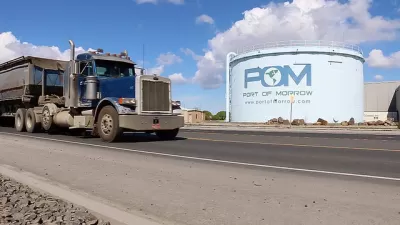Alberta Premier Rachel Notley announced a transformative three-pronged climate protection plan on November 22 that will cap greenhouse gas emissions from oil sands development, add a carbon tax, and phase-out coal power plants.
At a meeting where "the premiers and territorial leaders jointly met with the prime minister for the first time in nearly seven years, "Notley gave a brief summary of the plan she revealed Sunday which includes a phased-in $30/tonne carbon tax, a hard cap on oil sands emissions starting in 2017, and the ending of coal powered electricity generation by 2030," writes Josh Dehaas of CTV News.
Alberta is where Canada's vast oil wealth is located in the form of oil sands, which is said by many to be the most carbon-emitting type of oil. Despite the local economy suffering due to the plunge in oil prices, "the plans won plaudits from powerful oil executives along with environmental groups," write Justin Giovannetti and Jeffrey Jones for The Globe and Mail via Business News Networks.
New measures include (a) 100-megatonne cap on carbon emissions from the oil sands, Canada’s fastest-growing source of emissions, once new rules are adopted. It currently emits 70 megatonnes annually.
Nutley referred to the recent rejection of the Keystone XL pipeline:
“We got a major wake-up call a few weeks ago in the form of a kick in the teeth from the government of the United States,” Ms. Notley said. “Unfairly in my view, the President of the United States claimed that our production is some of the dirtiest oil in the world. That is the reputation that mistaken government policy in the past has earned for us.”
"British Columbia Premier Christy Clark later told reporters she was 'really pleased' with Alberta’s choice of a wide-ranging carbon tax regime similar to the one B.C. implemented in 2008." The Alberta webpage refers to the scheme as "carbon pricing."
Ontario and Quebec have committed to a cap-and-trade plan to reduce emissions. Ontario also managed to fully eliminate coal powered electricity generation by 2014, although not without complaints about growing electricity bills.
Arguably the most difficult part of the plan will be the phase-out of coal power plants which supply 55 percent of the province's electricity. According to CBC News:
Two-thirds of coal-generated electricity will be replaced by renewables — primarily wind power — while natural gas generation will continue to provide firm base-load reliability.
Read more on the plan on the provincial website.
Hat tip to Paul Gipe via Ed Mainland
FULL STORY: Alberta's climate plan lauded by premiers, PM at historic meeting

Planetizen Federal Action Tracker
A weekly monitor of how Trump’s orders and actions are impacting planners and planning in America.

Map: Where Senate Republicans Want to Sell Your Public Lands
For public land advocates, the Senate Republicans’ proposal to sell millions of acres of public land in the West is “the biggest fight of their careers.”

Restaurant Patios Were a Pandemic Win — Why Were They so Hard to Keep?
Social distancing requirements and changes in travel patterns prompted cities to pilot new uses for street and sidewalk space. Then it got complicated.

Platform Pilsner: Vancouver Transit Agency Releases... a Beer?
TransLink will receive a portion of every sale of the four-pack.

Toronto Weighs Cheaper Transit, Parking Hikes for Major Events
Special event rates would take effect during large festivals, sports games and concerts to ‘discourage driving, manage congestion and free up space for transit.”

Berlin to Consider Car-Free Zone Larger Than Manhattan
The area bound by the 22-mile Ringbahn would still allow 12 uses of a private automobile per year per person, and several other exemptions.
Urban Design for Planners 1: Software Tools
This six-course series explores essential urban design concepts using open source software and equips planners with the tools they need to participate fully in the urban design process.
Planning for Universal Design
Learn the tools for implementing Universal Design in planning regulations.
Heyer Gruel & Associates PA
JM Goldson LLC
Custer County Colorado
City of Camden Redevelopment Agency
City of Astoria
Transportation Research & Education Center (TREC) at Portland State University
Camden Redevelopment Agency
City of Claremont
Municipality of Princeton (NJ)




























